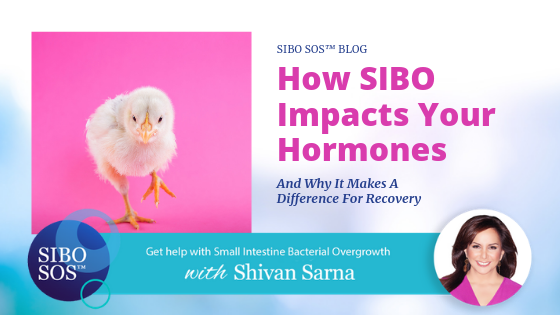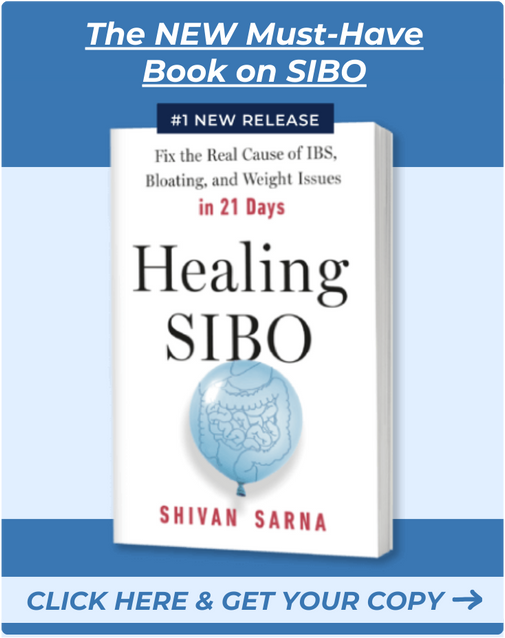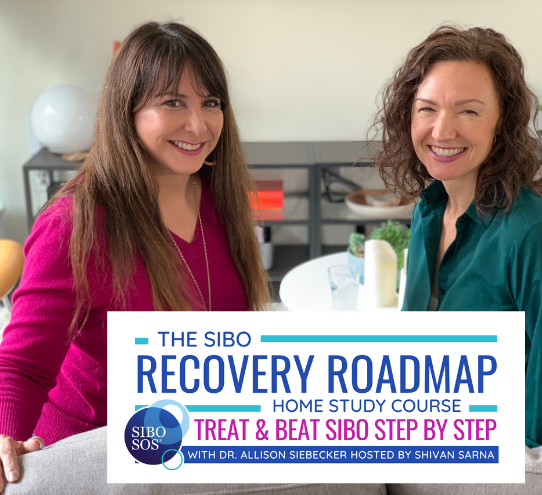Lately, hormones have been on my mind.
I just finished recording a brand new Workshop training with Dr. Steven Sandberg-Lewis, ND about hormones, the gut, SIBO, and how it’s all connected.
Dr. Sandberg-Lewis really explained to me HOW exactly the gut can impact our hormones (and it was information I’d never heard before). If you want to get access to the Workshop, go here.
Hormones are much more than estrogen and testosterone – there are about 50 different hormones in the body, and each has a really important function. They control everything from mood to weight – and they can cause SIBO and other gut issues to get worse (or develop). But having SIBO or other gut issues can also lead to hormone imbalances. It’s a “chicken and the egg” scenario.

Hormone imbalance and gut issues – which came first? It’s a chicken and the egg scenario!
Here’s what’s clear: whether you’re a man or a woman, and no matter your age, you NEED to be thinking about your hormone health. And especially if you have SIBO, IBS, or ANY gut issues.
(And especially if you’ve had your gallbladder removed or have had gallbladder issues in the past.)
Before watching the workshop with Dr. Sandberg-Lewis, I wanted to share a few interview snippets from past discussions I’ve had with experts about hormones.
My goal is to get you thinking and open your idea to new perspectives about hormones and SIBO.
SIBO & Fertility – Dr. Stefani Hayes, ND
Shivan Sarna: “You do treat a lot of people with SIBO, and also, with fertility issues. Tell us how you have observed a relationship between those two if you would.”
Dr. Stefani Hayes: “I think the relationship came about over several years of practice, especially with a lot of my patients who had unexplained infertility, or fertility struggles from PCOS or endometriosis. A lot of them didn’t have GI issues, but some of them did.
Because a lot of my colleagues are experts in SIBO, we started trying SIBO tests on a lot of my patients, and surprisingly, many of them came up highly positive usually with a methane-type SIBO overgrowth, which was really surprising for us.
And a lot of them didn’t have the constipation pattern that a lot of methane-type SIBO does. But they often had had constipation as young adults or young kids, but had learned over the years how to manage it. And sometimes literally never really struggled with much GI stuff beside some occasional bloating.
But when we addressed the SIBO, it seemed to make a significant effect on pelvic bowl health and their women’s health.
The connection between SIBO & Fertility.
Some got pregnant on their own, naturally, and were able to hold their pregnancies and have sweet, little kiddos.
Others tolerated IVF a lot better, and were able to start ovulating on their own with PCOS, if they hadn’t before, or were able to, with endometriosis, there’s often times—endometriosis is really tricky, and so patients who had had multiple surgeries, and then it re-grew, I definitely saw sometimes after we balanced out the SIBO that the endometriosis would re-grow slower, or not at all.
We would just get a little bit longer window between those surgeries, so that those patients could have more options for trying to get pregnant.”
Shivan Sarna: “Why do you think that is?”
Dr. Stefani Hayes: “Because the small intestine does really overlay, not just the uterus, but over the top of the ovaries, and when I think about methane-type bacteria, it’s a pretty noxious gas.
And if I think about what that might be like, I imagine it would seep into the surrounding region. And for me, I like to have visuals of things that seems to me like a fog or a smog, if you will, that’s in that whole pelvic bowl.
And so again, it’s coming back to that smog—if the neighborhood is not very happy, the some other neighboring structures can really get affected too, in my perspective.”
Cortisol & SIBO – Dr. Mona Morstein, ND
Dr. Mona Morstein: “Cortisol is kind of like Goldie Locks with the bears. Cortisol needs the middle chair and the middle bowl of oatmeal.
If there’s not enough cortisol there is development of gut inflammation. And that’s a problem because from gut inflammation we can lose our protective mucus lining, we can start changing our microbiome, we can start breaking away the IGG immunity there and start reacting to what would necessarily shouldn’t react to and so forth.
But if you have too much cortisol for over time it’s also inflammatory to the lining of the intestine as well.
There are so many ways to work with people along that level of cortisol. Whether it’s getting counseling, addressing their sleep, their stress and relaxation – do they do journaling or gratitude, do they exercise, are they creative? Do they take time, you know to relax, do they get into nature?
Broad-based look at ways that people are feeling bad. We can also of course use homeopathy. I do that quite a lot with people.
Of course supplements such as nutrients that support adrenal hormone functioning, there are botanicals that support and help balance what we call adapter genes. If the cortisol is low it can raise it up, if it’s high it can lower it down.
And of course diet, right? What you eat and drink can be very supportive to adrenal healing or very problematic to adrenal healing.
We can also get into methyltetrahydrofolic law because the adrenal gland needs a lot of mentholated enzyme reactions to have it function well, so it’s a broad-based look at both, since we do know that there is inflammation with SIBO.
Whatever else may be happening in their life, if we’re trying to heal that intestinal lining, heal the lining, heal the leaky gut, heal the nerves having a proinflammatory state is going to work against us in that regard through the cortisol.”
SIBO, Your Hormones, & Weight – Dr. Steven Sandberg-Lewis, ND
Dr. Steven Sandberg-Lewis: “Another really important thing is the “thyro-adrenal,” which is something I made up. Both the thyroid gland and the adrenal glands are so important in normalizing blood sugar, maintaining bone mass, helping with mood and energy and blood sugar, very, very important, and blood pressure as well.
Those glands are so important for the maintenance of normal function. And so often, in standard medicine, the only time you really look at the adrenals is when there’s 90% of their function gone. That’s called Addison’s disease. It’s very rare. It’s an autoimmune disease.
Or when a person has Cushing’s disease, which is when their stress hormone, cortisol levels are so high that everything goes haywire, and we can actually die from it. Very serious condition, which is a little more common than Addison’s.
But in naturopathic medicine and other forms of natural medicine, we like to look at the adrenals before they’re 90% gone because many people have a lot of dysfunction there, and you can’t really—in my book, you can’t really separate thyroid from adrenal. They work so closely together.
So that’s my suggestion is balance your adrenal and thyroid function, so that your blood sugar can normalize, so that you can lose the weight around your waist because that’s one of the better ways that we have of measuring abdominal fat or that apple fat.
The waist circumference for women, over 35-inches is too much. For men, over 40-inches is too much.
And so it’s easy enough to say, “Oh, lose that waist circumference. Bring it down. Just get to it.”
Well, that can be almost impossible. If your insulin levels are very high, and your DHEA levels are very low, and your cortisol is very high, that’s the worst group of hormonal levels that can lead to a waistline that just gets bigger and bigger.
You could lose weight all over your body. Your face might look amazing, but you can’t lose the weight around your waist. And that’s the weight that’s controlling the whole blood sugar issue, which causes GERD and causes SIBO and other digestive problems.
So the thyro-adrenal, if you would, gland is really important there. It’s just my way of letting my student doctors and my patients know that—it’s my way of thinking. It’s a little superficial to be treating somebody’s thyroid and ignoring their adrenal or vice versa. You have to look at both.”
SIBO & Hormone Balance
This blog isn’t meant to be comprehensive – there are plenty more ways SIBO and IBS interact with the hormones that I didn’t get a chance to cover in this post.
If you want to go deeper and really understand how gut health issues like SIBO and IBS can interact with your hormone levels, I hope you’ll watch the Workshop with Dr. Steven Sandberg-Lewis.
The Workshop includes a 1-hour class on the link between the gut (and specifically the gallbladder) and your hormones. It also includes a 2 hour recording of a Q&A with Dr. Steven Sandberg-Lewis.













2 thoughts on “How SIBO impacts your hormones: what you need to know to heal Small Intestine Bacterial Overgrowth”
Could you please provide dates for the remainder of the workshops?
Thank you,
Martha Sluder
Hi Martha,
You can see the complete schedule and get all the details here: Testing & Treatment: How to Identify if you have SIBO/IMO